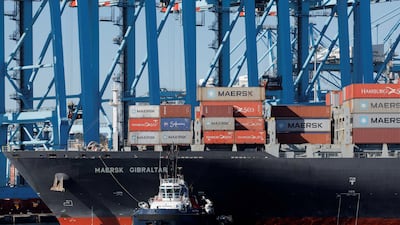Live updates: Follow the latest news on Israel-Gaza
Four of the world's five biggest shipping companies have suspended their operations in the Red Sea after missile attacks by Yemeni Houthi rebels, risking disruption to trade.
Mediterranean Shipping Company (MSC), the world's largest shipping group, and French company CMA CGM took the step following similar decisions taken by shipping major Maersk and German company Hapag-Lloyd.
The move comes after missiles launched from areas controlled by the Houthis were aimed at a cargo ship carrying jet fuel last week, escalating a crisis started by the Israel-Gaza war.
The Houthis said they will continue to attack ships they believe to be heading to Israel as a conflict in Gaza that has killed more than 18,400 Palestinians continues.
MSC said its container ship Palatium III was "attacked" on Friday while transiting the Red Sea, with the vessel suffering "limited fire damage". It has now been taken out of service. "Due to this incident and to protect the lives and safety of our seafarers, until the Red Sea passage is safe, MSC ships will not transit the Suez Canal Eastbound and Westbound. Already now, some services will be rerouted to go via the Cape of Good Hope instead," the company said. "This disruption will impact the sailing schedules by several days of vessels booked for Suez transit."
AP Moeller Maersk and Hapag-Lloyd also aid their vessels had come under Houthi fire. Maersk made the decision following a “near-miss incident involving Maersk Gibraltar”, which was en route from Oman to Saudi Arabia.
Copenhagen-based Maersk said “the recent attacks on commercial vessels in the area are alarming and pose a significant threat to the safety and security of seafarers”.
“Following the near-miss incident involving Maersk Gibraltar yesterday and yet another attack on a container vessel today, we have instructed all Maersk vessels in the area bound to pass through the Bab Al Mandeb to pause their journey until further notice.”
Maersk's suspension is understood to be indefinite. Germany's Hapag-Lloyd, meanwhile, made a similar statement, but said it was pausing its operations until December 18.
“Hapag-Lloyd is interrupting all container ship traffic across the Red Sea until Monday,” the Hamburg-based company said.
Hapag-Lloyd said “there has been an attack on one of our ships”, which was on its way to Singapore from the Greek port of Piraeus.
No casualties have been reported as a result on the attacks on the companies' ships, both of which continued their journeys.
“Commercial traffic transit in the Red Sea is more dangerous now than it was before because of these Houthi attacks on commercial shipping,” US National Security Council spokesman John Kirby said.
The suspensions – it is unclear whether other shipping companies will follow suit – will add to an already highly tense and fraught situation in the area.
The Bab Al Mandeb stretches 32km from the southern end of the Red Sea to the western end of the Gulf of Aden, and is a critical route, especially for oil tankers, between the Arabian Gulf, Asia, Europe and North America, through the Suez Canal.
More than 17,000 ships pass through the strait annually – meaning any disruption there would have a significant impact on global trade, according to Coalition Task Force Sentinel, the operational arm of the Bahrain-based International Maritime Security Construct.
The Suez Canal also accounts for 30 per cent of all ship traffic, meaning any disruption within these waterways will have a domino effect that could have dire consequences.
Most petroleum and natural gas exports from the Arabian Gulf to Europe and North America pass through chokepoints such as the Suez Canal or the Sumed pipeline, and both the Bab Al Mandeb and the Strait of Hormuz.
Total oil shipments through these routes accounted for about 12 per cent of total seaborne-traded oil in the first half of 2023, and shipments of liquefied natural gas comprised 8 per cent of global LNG trade, data from the US Energy Information Administration showed.
The Suez Canal and Sumed pipeline, meanwhile, are located in Egypt and connect the Red Sea with the Mediterranean Sea. Sumed transports crude north through Egypt and has a capacity of 2.5 million barrels per day, the EIA said.
Although oil flow trends through Bab Al Mandeb are similar to those of the Suez Canal, more oil exits the Red Sea than it enters through these chokepoints.
LNG shipments through Bab Al Mandeb have matched those in the Suez Canal over the last few years because the few LNG import terminals in the Red Sea have been used less, it said.
Aside from oil, food products, like palm oil and grains, and practically anything that is shipped pass through these routes, and any disturbance could significantly affect commodities markets and supplies.
Shipping costs have shot up. Israeli ship operators, in particular, have had to deal with costs that are as much as 250 per cent higher, with some insurers refusing to cover them, the Associated Press reported.
“This issue cannot be addressed by the global shipping industry alone, and we urge the international society to come together to find a swift resolution to bring the situation under control,” Maersk said.


